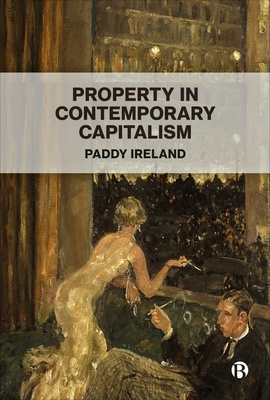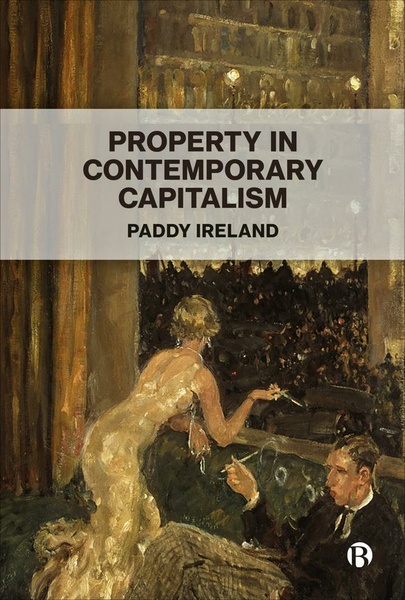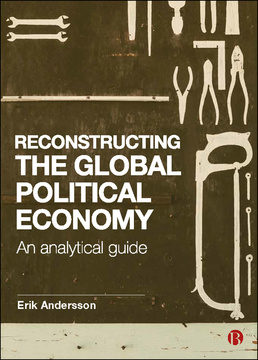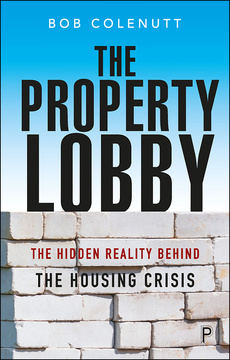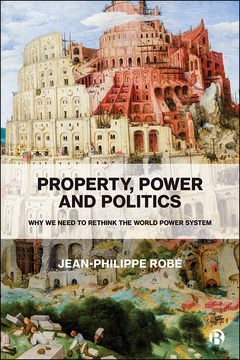Property in Contemporary Capitalism
By Paddy Ireland
Published
Jul 31, 2024Page count
310 pagesISBN
978-1529238143Dimensions
234 x 156 mmImprint
Bristol University PressPublished
Jul 31, 2024Page count
310 pagesISBN
978-1529235784Dimensions
234 x 156 mmImprint
Bristol University PressPublished
Jul 31, 2024Page count
310 pagesISBN
978-1529235791Dimensions
234 x 156 mmImprint
Bristol University PressPublished
Jul 31, 2024Page count
310 pagesISBN
978-1529235791Dimensions
234 x 156 mmImprint
Bristol University PressAmid the shift towards neoliberalism and the privatization of resources, this book provides a radical new lens to view property and property theory.
Boldly challenging the conventional theories of property law that have shaped our understanding for centuries, leading expert Paddy Ireland explores the rise and growth of new intangible property forms; the nature of ‘investment’ and of property-as-capital; and the empirical realities of modern property.
Raising broader questions about ownership in society, the author ignites a powerful conversation about the increasingly unequal distribution of wealth, forcing us to confront that our current property system bears considerable responsibility for the current ‘polycrisis.
This groundbreaking work will set the agenda for a new era in property theory.
"In this significant new book, which contains a powerful rebuttal of the ‘truth’ of law and economics, Ireland turns his gaze toward what that other great heretical Marxist, E P Thompson, called ‘logics of process’, understanding property relations in terms of historically specific economic and social dynamics." Emilios Christodoulidis, University of Glasgow
"This book exposes the flaws of mainstream theories of property and deftly explains the complexities of ownership that characterise today’s financialised, extractive, debt-based economies. It challenges reformers content with addressing capitalism's surface issues, urging for a deeper systemic change." Anna Chadwick, University of Glasgow
"This is an absorbing and important book, essential reading for anyone interested in what property is and how it works. It gives a fascinating and highly persuasive account of the fundamental mismatch between the notion of property as assumed by mainstream property theory and as it actually exists in contemporary capitalism." Alison Clarke, University of Surrey
Paddy Ireland is Professor of Law at the University of Bristol.
1 Introduction
2 From Thing-Ownership to Bundle of Rights to Social Relation
Property as thing-ownership: the Blackstonian conception
'Heroic reification': creating objects of property
The conceptual limitations of ‘property’ and ‘ownership’
The rise of property as thing-ownership
From bundle of rights to social relation
Vanishing into thin air: property as a ‘conceptual mirage’
3 The Dual Nature of Property
The revolution in property: institutionalising modern property
Private property, individual autonomy and identity
Personal possessions versus productive resources
Capital, capitalist and capitalism
Property-as-capital
The reconceptualisation of the joint stock company share
4 Profiting from the Efforts of Others
Capital and investment
Profiting from the ownership of productive resources
The rise of ‘rentierism’
The new enclosures
Profiting from debt
The distribution of wealth and capital
The gender, racial and inter-generational dimensions of wealth inequality
Ownership of public debt
Rising private wealth, declining public wealth
Speculating on the future
5 Defending the Property Status Quo: Analytical Jurisprudence
The new essentialism: reviving property as thing-ownership
The ubiquity of property institutions
The dangers of abstraction
Dominium in Roman law
The idea of property in law
6 Defending the Property Status Quo: Law and Economics
The modern corporation and the threat to shareholder rights
Social democracy and the socialised corporation
Defending the rentier: the market for corporate control
Contractual theories of the corporation: reprivatising the public company
The fictional corporation rematerialises
The rise of financialised corporate governance
Information cost theories of property
Facilitating the market: functionalism and efficiency
Property rights as ‘special’
7 Safeguarding Property-as-Capital
Universalising capitalism
Historicising property: private property and capitalism
Creating property-as-capital
Prioritising the investor interest
The new aristocracy of finance
Containing democracy: the ‘new constitutionalism’
Derisking new property
Neoliberal ideology versus neoliberal practice
8 Property and Social Transformation
Property as a historical category
Thing-ownership, bundles of rights or social relation?
The social relational dimensions of property
Bringing capitalism back in
Capitalism’s logic of process
The moral logic of capitalism
Changing the logic: gradual transformative change?
References
Index







